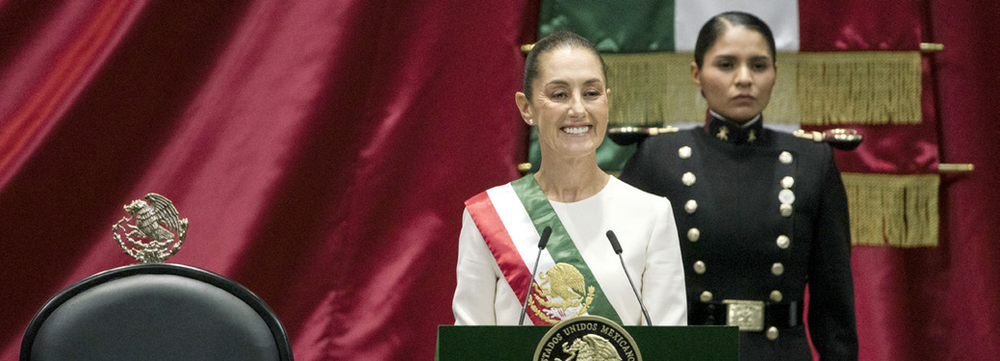
By Emiliano Rodríguez Mega and Natalie Kitroeff
Earlier this week, Mexico’s lower house of Congress sanctioned extensive new measures that would eliminate legal challenges to changes in the constitution, granting lawmakers the ability to modify the country’s charter without judicial scrutiny — including from the Supreme Court.
The legislation, having already received the Senate’s approval the previous week, has faced backlash from legal academics and human rights advocates, who assert it would dismantle any judicial oversight of constitutional issues, effectively granting the ruling Morena party unrestrained authority to implement significant alterations to the nation’s laws.
Most state legislatures are anticipated to endorse the proposal in the upcoming days, setting the stage for the president to enact it into law.
This initiative emerges amidst a critical time for Mexico, as key governmental branches edge towards overt conflict over the essential structure of the judicial system and its intended role within the nation’s democracy.
“If this reform goes through, it places us in a scenario of unlimited power,” stated Guadalupe Salmorán Villar, a researcher focused on global rule of law and constitutional democracy in Mexico City. “It’s a blatant effort by the federal administration, backed by the dominant congressional presence of Morena and its allies, to politically dominate the judiciary.”
Olga Sánchez Cordero, a Morena representative, mentioned that while the initiative would prevent courts from assessing the substance of constitutional amendments, it would not forbid challenges based on procedural matters. She pointed out that until now, the constitution lacked clarity on how modifications to the charter could be revised, but now, there would be “a clear, explicit, unequivocal mechanism” for assessing them.
When asked whether she was worried that a future opposition majority in Congress might utilize the new legislation to implement constitutional changes that endanger human rights, such as making abortion illegal, Sánchez Cordero responded: “I hope I am dead by then.”
What led Mexico to this juncture?
The clash regarding Mexico’s courts began, in essence, when the ruling Morena party and its allies secured overwhelming victories in the summer elections, granting them effective congressional supermajorities.
They leveraged that influence to enact a significant judicial reform last month. This new initiative seems to be a direct counter to attempts to impede that reform.
The latest development: The Supreme Court is scheduled to deliberate on a resolution next week that could nullify key aspects of the reform, setting it on a collision course with the legislature and potentially the president.
Ricardo Monreal, the ruling party’s head in the lower house, has asserted that even if a majority of justices endorse the resolution, lawmakers would choose not to acknowledge it as legitimate.
The judicial redesign mandates that judges, including Supreme Court justices, be selected through popular elections and subject them to evaluation by a disciplinary tribunal composed of elected officials endowed with substantial authority to investigate and even impeach judges.
Advocates claim it will help eradicate corruption and favoritism within the court system. Detractors argue it would undermine judicial independence and politicize the courts.
The reform was met with a wave of over 500 legal challenges aimed at obstructing its approval and implementation from civic organizations, opposition lawmakers, and judges themselves.
Rather than formally contesting those rulings, legislators and the new president, Claudia Sheinbaum, have opted for a more straightforward approach: They have chosen to disregard them.
“A judge is not above the people of Mexico,” Sheinbaum stated to reporters earlier this month, emphasizing that voters have granted her administration a broad mandate to implement constitutional modifications.
How critical is the new change?
This new proposal appears to be a strategic move to neutralize opposition to the ruling party’s legislative agenda, according to experts.
If enacted, Mexico would not stand alone in adopting measures to limit the authority of the judiciary. Other nations have attempted similar endeavors.
In the 1970s, when Indian Prime Minister Indira Gandhi curtailed numerous constitutional rights, an amendment granted Parliament unbounded authority to alter the constitution and eliminated the judiciary’s ability for judicial review.
In 2013, Hungary’s Prime Minister Viktor Orban, whose party held a parliamentary supermajority, implemented a provision stipulating that the constitutional court could only examine procedural matters, not the substance of constitutional amendments.
In Mexico, critics caution that this initiative could have detrimental effects on the nation’s nascent democracy.
“If tomorrow this majority or any future majority opts to restore the death penalty, it indicates that the courts would be powerless to intervene,” remarked Javier Martín Reyes, a law professor at the National Autonomous University of Mexico. “The moment you add something to the constitution, it becomes untouchable.”
